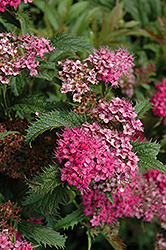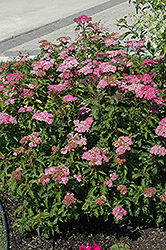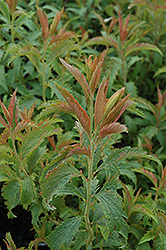Height: 3 feet
Spread: 4 feet
Sunlight:
![]()
Hardiness Zone: 3b
Other Names: Spiraea japonica
Description:
A mounded, spreading garden shrub with showy flat-topped clusters of carmine-red flowers held over unusual toothed and crinkled foliage; excellent for unusual texture effect and in groupings, needs full sun and well-drained soil
Ornamental Features
Crispa Spirea features showy clusters of rose flowers at the ends of the branches from late spring to early summer. It has attractive bluish-green deciduous foliage which emerges red in spring. The small twisted pointy leaves are highly ornamental and turn an outstanding coppery-bronze in the fall.
Landscape Attributes
Crispa Spirea is a multi-stemmed deciduous shrub with a more or less rounded form. Its relatively fine texture sets it apart from other landscape plants with less refined foliage.
This shrub will require occasional maintenance and upkeep, and is best pruned in late winter once the threat of extreme cold has passed. It is a good choice for attracting butterflies to your yard, but is not particularly attractive to deer who tend to leave it alone in favor of tastier treats. It has no significant negative characteristics.
Crispa Spirea is recommended for the following landscape applications;
- Mass Planting
- General Garden Use
Planting & Growing
Crispa Spirea will grow to be about 3 feet tall at maturity, with a spread of 4 feet. It tends to fill out right to the ground and therefore doesn't necessarily require facer plants in front. It grows at a fast rate, and under ideal conditions can be expected to live for approximately 20 years.
This shrub should only be grown in full sunlight. It prefers to grow in average to moist conditions, and shouldn't be allowed to dry out. It is not particular as to soil type, but has a definite preference for acidic soils, and is subject to chlorosis (yellowing) of the foliage in alkaline soils. It is highly tolerant of urban pollution and will even thrive in inner city environments. This particular variety is an interspecific hybrid.
Disclaimer - This resource is provided for informational purposes only and does NOT reflect current availability. Inventory varies seasonally, so we cannot guarantee that every plant will be in stock at all times - please contact your favourite GardenWorks location directly for current availability. It does not include our entire inventory of plants, so be sure to visit GardenWorks to see varieties that may not be represented on this list.



